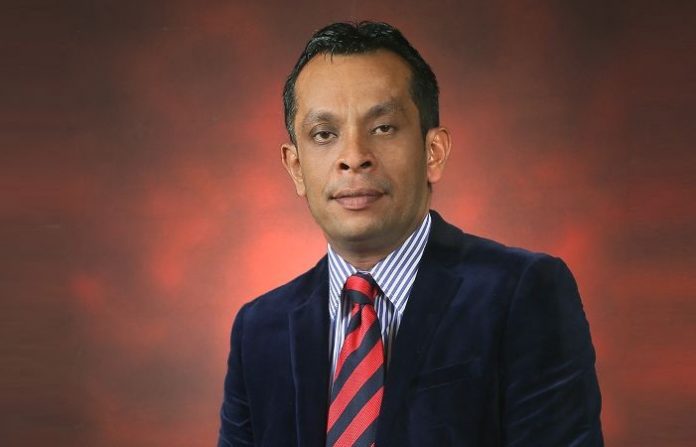In an exclusive conversation with SightsIn Plus, Ishan Dantanarayana, Global Chief People Officer and member of the Leadership Team of Brandix Group Sri Lanka. Brandix Group is conferred as Sri Lanka’s single largest exporter and employer. Brandix is also the largest underwear exporter to the United States & Europe out of India.
Brandix employs over 50,000 Associates directly, whilst generating indirect employment to an equivalent number. The Group is supported by over 42 integrated manufacturing facilities in Sri Lanka, as well as strengthened by a 1000 acre state of the art industrial park operation in India. Brandix additionally runs large manufacturing operations in Bangladesh and in Haiti/ Dominican Republic. Brandix is one of the largest suppliers of apparel to the United States & Europe, namely to brands such as Victoria’s Secret, Express, GAP Inc, Marks & Spencer, H&M, Uniqlo, CK, PVH, Under Armour, Levis, Lidl, etc.
Brandix takes pride in being an early adopter of Green Manufacturing due to the vast concern for the environment and society at large. This is recognized with many global awards won in appreciation of the same.
Q- What is gender bias to you? Does GB (Gender Bias) exist or is it a myth?
Gender bias to me is, if someone experiences a different impact at a company, in a working environment or the society at large due to their gender. Gender Bias exists in certain countries, organizations, and societies. From a country perspective, gender equality may have a difference between masculine and feminine countries but most organizations I believe strive to treat all genders equally. Whilst this is not a myth, how the individuals, organizations, and societies perceive it also influences whether gender bias exists or not.
Q- What are the barriers to women’s career advancement?
Most women that I have spoken to have not said that they have particularly had issues in career advancement due to gender bias. Of course, personal circumstances based decisions, particularly so for females could impact career advancement. How organizations create the environment and facilities to minimize such impact will entail that any bias towards any gender can be avoided or minimized. Herein, it is also important to look at the organization’s processes, rules and culture must rally in terms of support, to enable particularly females to add value in a manner that is comfortable and not adversely impacting their personal commitments.
Q- Do you also think sometimes its women’s own belief is the block in their career growth?
This could be a possibility if women lose sight of the issue and rather look at things from a personal perspective. This is to say that if an issue occurs and based on the same there is an impact that is created as an outcome, a female should ask the question and assess, whether it was so because she is a female or would it have been common to all genders. If it would have been common to all, then taking it personally on the basis of the gender would only result in taking up a victim role. Once again, most professional females that I have spoken to tell me that whatever issues they came across, they did not think of these as due to their gender but rather took them on an issue basis and therefore did not feel discriminated. Also, some females who have been thoroughly confident of themselves and not taken up the victim role has outsmarted men as seen in some of the largest companies around the world.
Q- What do you think are the major challenges to have Gender Equality in the Country?
I strongly feel that gender equality is increasingly seen in most countries and is also within the trend. Herein the culture, values, perceptions, and beliefs play a pivotal role. Understanding that a truly winning situation, be it to a country or organization, can only be created by bringing in the distinctive values that all genders can offer is critical to rid-off gender bias. Herein, the diverse perspectives that feminine leadership brings in with the capacity to contribute towards transformation with flexibility, adaptation, and creativity should be seriously considered by senior leadership who should treat respect to diversity as a priority. I don’t think women are asking for anything special over men but rather seek support to enable them to accommodate their life’s commitments and meanwhile contribute in a manner that does not impact their responsibilities. It is also to be noted that in today’s world, gender covers not only males and females but others too and all of them should be treated equally.
Q- How do you ensure Gender Equality and women empowerment at the workplace?
Gender equality at work is assured by not treating genders differently. This is applicable to all decisions stemming from selection, hiring, performance, career growth, engagement, retention and compensation, and rewards. If all genders are treated equally, then segregation in key decisions will not occur and this will ensure fairness across all genders. Additionally, creating female professional pipelines across all levels of the organization is critical. Enabling them to interact among themselves internally as well as network externally with similar professionals, will also add much value by way of their development and sharing of best practices.
Q- Do you agree that Women’s family priorities are one of the obstacles in their career growth? If yes, then how can this problem be addressed?
Family priorities could be an obstacle to a woman’s career if she is unable to balance these with her work life. Supporting her to accommodate these responsibilities whilst working will enable organizations to gain value from females and retain them by way of negating or minimizing any adverse impact on their family life. Hence, the reasons that organizations that have understood this value are having creches, special facilities afforded such as car service, laundry, salons at the office, special transport arrangements, flexible working methods, creating support networks, assistance for payments related to utilities, etc. Whilst such services will be particularly valued by women, it can be gender agnostic since these will contribute towards retaining all genders. Of course, these will be critically valued, particularly by women. Also, governance processes in the organizations should ensure equal respect and care and that opportunity is afforded for all genders equally. For example; policy documents, codes of conduct, processes, should be such that they augment equal treatment for all genders.
Q-What can individuals and organizations do to support the Gender Equality?
It should commence by setting the values and the culture to respect and care for all genders equally. Also, treat the uniqueness of the varied genders with empathy and understanding. Appreciate that diversity can be a huge value since, it brings in diverse perspectives to any country, society, organization, function or team. Individuals and organizations should understand this value and seek ways to maximize the same. In certain cases, a shift in the thinking patterns will be required. Best practice sharing, coaching, mentoring, training, and education are also necessary. Further, individuals and organizations should abide by the laws that are in force to ensure gender equality.
Q- Do you think Gender Equality is a concern for men?
I don’t think gender equality is a concern for men if they don’t see it unfairly impacting their careers or lives. This could happen for example, if in an organization for the mere sake of achieving a KPI if a promotion is granted to an undeserving female over a male who fully qualifies for it. Hence, this is where the processes should be aligned to merit & value, rather than merely on gender. Some organizations have targets in terms of percentage of females in leadership, etc., as KPIs but herein it is critical to elevate these members to the relevant positions on merit and with a benchmark that does not have a gender bias.
Q- How can male leaders, advance gender equality?
Leaders irrespective of whether you are a male or female should treat all genders equally. This applies to men treating men & women and also women treating men & women, equally. The same applies to all genders. Whilst we talk of women and gender, certain female leaders also need to strengthen their capacity to lead their own gender. This is the reason that when asked from a “woman” whether you prefer a female or male boss, quite a few still say, they prefer a male boss. Wherever this is the case, such female leaders need to reflect upon themselves and see what they should do or how they need to change, to be able to become role models to their gender as well as overall. This will create equal opportunity for all genders.
Q- Last but not least, what would be your advice to the HR folks on it?
HR folks should enable and govern in such a way that the organization’s values, cultures, systems, processes, and procedures treat all genders equally. To do so, education, coaching, mentoring, role modelling, training, and corrective action should be promoted by HR. HR should ensure that these are understood and led by the leaders across all levels, who should own as one team, the task of providing equal opportunity for all. Only then will an organization reap its full potential and propel its business growth. This would result in a positive brand image across all stakeholders that will further elevate the stature of the organization. It will be the contribution that HR influences towards organizational excellence, growth and in creating a solid foundation, built on a strong value-based culture. Also, all should realize that diversity is not merely an initiative, rather a strategic process that truly drives business value. Hence, it should be a priority for HR and all Leaders.
Thank you, Ishan!









